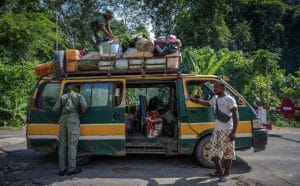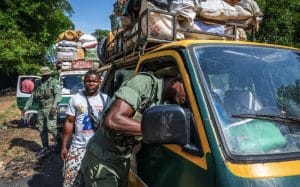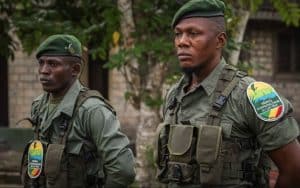
Eco-guards inspecting a vehicle at the barrier © Jane Wynyard
An ECF-funded security barrier, strategically positioned between one of the Republic of Congo’s most densely populated dwarf crocodile habitats and a bustling bushmeat market, is playing an important role in curbing the industrial bushmeat trade and reducing ivory trafficking.
In the last four years, eco-guards at the barrier on the approach to Lac Télé Community Reserve have confiscated more than eight tonnes of bushmeat, much of it destined for Impfondo – the capital of the Likouala District of northern Congo and one of the country’s largest bushmeat markets.
The barrier lies along the Impfondo-Epéna road amidst a landscape of flooded savannah, swamp forests, peatland and dry land. Here, bushmeat poaching is rife. Dwarf crocodiles – a vulnerable species endemic to the Congo Basin and a favourite food amongst the locals – are mostly hunted and traded alongside primate and antelope.
Lac Télé Community Reserve, located at the heart of the world’s largest swamp forest, was created in 2001 and covers over 4,400 km2. About 20,000 people live in villages scattered throughout the reserve, relying on its ecosystem for their well-being and livelihoods.

Eco-guards inspecting vehicles at the barrier at the Lac Télé Community Reserve © Jane Wynyard
Eco-guards, employed by the Wildlife Conservation Society to manage the barrier, inspect roughly 15 vehicles, including motorbikes, taxis and private cars, every day for bushmeat, ivory and other illegal items including weapons. In 2023 they confiscated two elephant tusks which were believed to have been poached from an elephant in Terra Kabounga, a notorious hotspot north of Lac Télé.
Of the 18 eco-guards employed in the area, one unit operates at the barrier, while two patrol the forest on foot. Selected from the local community, these eco-guards undergo extensive training, covering field deployment, human rights, first aid (funded by the Elephant Crisis Fund), and investigative techniques. Upgraded accommodation at the barrier and ranger equipment, also funded by the ECF, ensure effective patrolling across the challenging landscape.
For the past 20+ years, the Wildlife Conservation Society has implemented anti-poaching infrastructure and deployed personnel in the reserve with the support of the Elephant Crisis Fund and other donors. WCS also set up a wildlife crime programme in northern Congo with a unit in the nearby town of Impfondo, which has significantly contributed to the arrest and conviction of several high-profile poachers over the years. As a result of these efforts, there have been no recorded incidents of elephant poaching within Lac Télé since 2018.

Eco-guards wearing ECF-funded ranger equipment © Jane Wynyard
Says WCS Congo’s Project Director, David Brugière, “The Lac Télé Community Reserve is at the southern edge of the range of the second largest surviving forest elephant population in Africa so has strategic importance for law enforcement across northern Congo. The barrier is essential to protecting the biodiversity of Lac Télé Community Reserve. We are grateful to organisations like the Elephant Crisis Fund for supporting our wildlife protection efforts.”